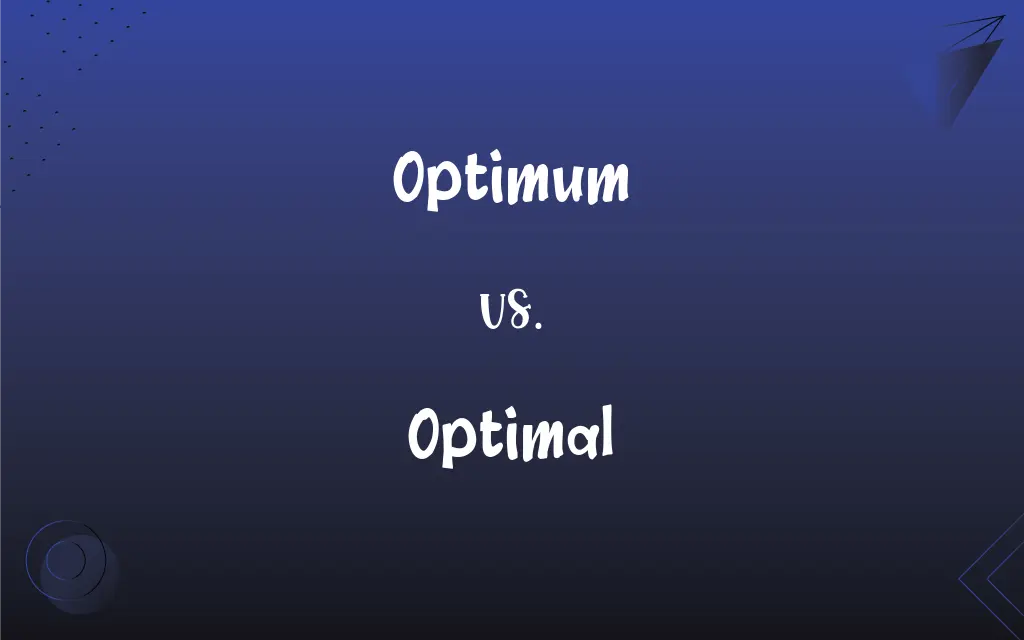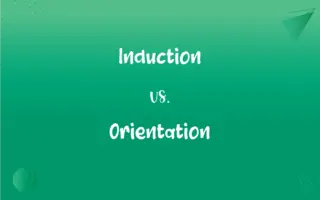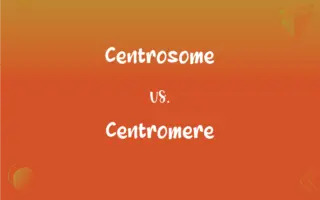Optimum vs. Optimal: What's the Difference?
Edited by Aimie Carlson || By Harlon Moss || Updated on October 15, 2023
"Optimum" denotes the most favorable condition or greatest degree, while "optimal" describes the most desirable or effective outcome.

Key Differences
"Optimum" is a noun in American English. It signifies the most favorable situation or level for growth, reproduction, or success. For instance, when we say, "We've reached the optimum amount of sunlight for the plants," it means the plants have received the most advantageous amount of sunlight they need to thrive.
"Optimal," on the other hand, is an adjective in American English. It's used to describe the most favorable or desirable condition, or the best result under specific circumstances. For example, "The garden is receiving optimal sunlight," means the garden is getting the ideal amount of sunlight for the best outcome.
"Optimum" can also serve as an adjective, albeit less commonly than its primary use as a noun. When used as an adjective, "optimum" directly modifies a noun, indicating the best or most favorable degree of something. For example, "This is the optimum solution," implies that the solution is the best or most favorable among alternatives.
Conversely, "optimal" doesn't function as a noun but is always an adjective, modifying nouns to suggest the most effective, perfect, or desirable condition. In a sentence like, "He has achieved optimal performance levels," "optimal" describes the peak, or most desirable, level of performance.
"Optimum" and "optimal" are often used interchangeably in American English, which is generally accepted in everyday language. However, the distinction lies in "optimum" primarily being a noun (but sometimes an adjective) and "optimal" always an adjective. Both words derive from the Latin "optimus," meaning "best," and they continue to carry that connotation in modern usage.
ADVERTISEMENT
Comparison Chart
Part of Speech
Primarily a noun, occasionally an adjective
Always an adjective
Definition
Represents the best outcome or condition possible
Describes the most desirable or effective state
Usage in a Sentence
"We achieved the optimum in production."
"We achieved optimal production."
Flexibility
Can be used both as a noun and an adjective but less often
Used as an adjective, not flexible in function
Interchangeability
Sometimes used interchangeably with "optimal"
Often used interchangeably with "optimum"
ADVERTISEMENT
Optimum and Optimal Definitions
Optimum
Most favorable or advantageous; best.
This soil is of optimum richness for planting.
Optimal
Pertaining to the best or most desirable outcome.
We're creating optimal learning conditions.
Optimum
The most conducive situation to a specific outcome.
The lab has found the optimum conditions for crystal growth.
Optimal
Most favorable, advantageous, or effective.
He's running at optimal speed.
Optimum
The greatest degree or best result obtained or obtainable under specific conditions.
We've reached the optimum speed for fuel efficiency.
Optimal
Most desirable or satisfactory; best.
She's in optimal health.
Optimum
The most satisfactory level or amount.
We need to find the optimum balance between work and rest.
Optimal
Relating to the most effective or advantageous point or state.
The company is performing at its optimal capacity.
Optimum
The point at which the condition, degree, or amount of something is the most favorable.
Optimal
Ideal or perfect in terms of suitability or effectiveness.
We've chosen the optimal location for the store.
Optimum
(Biology) The most favorable condition for growth and reproduction.
Optimal
Most favorable or desirable; optimum.
Optimal
The best, most favourable or desirable, especially under some restriction.
Finding the optimal balance between features and price is a common problem.
FAQs
Is "optimal" ever a noun?
No, "optimal" functions only as an adjective.
Can "optimum" and "optimal" be used interchangeably?
In everyday language, they are often used interchangeably, but strictly speaking, "optimum" is a noun or adjective, and "optimal" is an adjective.
Can "optimum" be used as an adjective?
Yes, "optimum" can be used as an adjective, though it's primarily used as a noun.
Are "optimum" and "optimal" synonyms?
They are closely related but not exact synonyms; "optimum" can be a noun or adjective, while "optimal" is always an adjective.
Is "optimal" used for comparative purposes?
Yes, it describes the most favorable compared to others.
Do "optimum" and "optimal" have negative connotations?
No, both words have positive connotations, indicating the best or most favorable conditions.
Can "optimum" refer to a range?
Yes, it can refer to the most favorable point or range.
What's the origin of "optimum" and "optimal"?
Both derive from the Latin "optimus," meaning "best."
Can "optimum" denote perfection?
It denotes the best condition or degree, which might be considered perfect in context.
Does "optimal" imply no need for improvement?
It suggests the best current state, though improvement may always be possible.
Is "optimum" commonly used in business?
Yes, it's often used to denote the best results.
Are "optimum" and "optimal" formal or informal?
Both words are standard in formal American English.
Can "optimum" be used in scientific contexts?
Yes, it's often used to describe ideal conditions for scientific phenomena.
Is "optimal" suitable for mathematical contexts?
Absolutely, it's used to describe the most favorable outcome in calculations or algorithms.
Does "optimum" apply only to tangible things?
No, it can also refer to abstract concepts like conditions or levels.
Does "optimal" have a superlative form?
No, as an adjective denoting the best, it's already in superlative form.
Are "optimum" and "optimal" subjective terms?
They can be, depending on context and perspective.
Can "optimal" describe emotional states?
Yes, it can describe the most favorable emotional conditions.
What's the plural of "optimum"?
The plural is "optima."
About Author
Written by
Harlon MossHarlon is a seasoned quality moderator and accomplished content writer for Difference Wiki. An alumnus of the prestigious University of California, he earned his degree in Computer Science. Leveraging his academic background, Harlon brings a meticulous and informed perspective to his work, ensuring content accuracy and excellence.
Edited by
Aimie CarlsonAimie Carlson, holding a master's degree in English literature, is a fervent English language enthusiast. She lends her writing talents to Difference Wiki, a prominent website that specializes in comparisons, offering readers insightful analyses that both captivate and inform.
































































